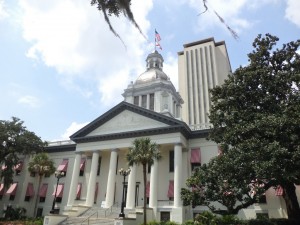Florida’s 60-day legislative session ended Friday. Lawmakers passed a host of educational choice bills, some high-profile and others under the radar, affecting charter schools, home education, public-school open enrollment, and more.
Other measures, from a constitutional amendment backed by charter supporters to a bill creating new dyslexia-focused schools of choice, didn’t get very far.
Of the issues we were watching, here’s a rundown of what passed, and what didn’t.
Charter schools. Some big charter school proposals — a new path to high-performing charter expansion, the creation of a charter school institute at a state university, new rules for “high-impact” charters that want to open in struggling neighborhoods — fell by the wayside. But omnibus legislation headed to Gov. Rick Scott would change the distribution of facilities funding, bar charters from removing students based on academic performance, and require them to submit more details of their operating histories when they apply to open new schools. HB 7029.
Personal Learning Scholarship Accounts. One of the first measures passed during the session, and already approved by the governor, expanded education savings accounts for special needs students and gave them a new name: Gardiner Scholarships. The bill was part of a larger package championed by the program’s new namesake, Senate President Andy Gardiner, to create a “cradle-to-career pathway” for people with special needs. SB 672.
McKay Scholarships. Legislation headed to the governor would allow children to use the state’s popular voucher program for special needs students to pay for transition-to-work programs at private schools. It would also allow foster children to use the scholarships without first enrolling in public schools. HB 837
Public school choice. The big, sweeping education bill (HB 7029) revives and slightly tweaks a big piece of unfinished business from last year. If approved by the governor, it would create statewide open enrollment for public schools, allowing parents to enroll their children in any public school in the state that has room.
Competency-based education. Gov. Scott will get to decide on a measure that would create a pilot program, giving four Florida school districts and one university lab school greater freedom to experiment with competency-based education. Students would advance through units and courses based on what they know rather than the amount of time spent in class. HB 1365/SB 1714
Charters and the constitution. For all the heat focused on a proposed constitutional amendment creating a statewide charter school authorizer, SJR 976/HJR 759 did not pass the House and was never heard in the Senate.
City-sponsored charters. A bill that would have allowed cities to sponsor charter schools cleared one committee in the Senate, and didn’t get heard in the House. SB 808/HB 1255
Home education. HB 837, which has already been presented to the governor, would allow home education students to receive special needs services from their local school districts without enrolling their children full-time. A separate measure, HB 793, would equalize test score requirements in the state’s Bright Futures scholarship program. Right now, students who were taught at home have to earn higher SAT or ACT scores to qualify for a scholarship.
VPK. Per-student funding for the state’s Voluntary Pre-Kindergarten program, which is one of the state’s most popular school choice programs, was kept flat. A last-minute amendment would help ensure the program is open to five-year-olds who had not previously used the program.
State budget. Among other things, the state budget would increase charter school facilities funding from $50 million to $75 million, and digital classrooms funding from $60 million to $80 million.
Class size. A measure (SB 1634) that would have required school districts to specify why the schools they dub “schools of choice” are truly innovative, and created similar requirements for charter schools, advanced in the Senate but did not find a companion in the House.
Computer coding. SB 468/HB 887 would have allowed students to meet foreign language requirements with computer science courses, but ultimately the bill died after competing House and Senate proposals couldn’t be reconciled.
Principal autonomy. Late Friday, lawmakers overwhelmingly approved HB 287, reviving an effort to give greater autonomy to principals looking to turn around struggling district schools.
Advanced courses. While several measures expanding opportunities for college coursework didn’t cross the finish line, the revised HB 837, now headed to Gov. Scott, would eliminate some legal complications that have hampered dual enrollment access for home education and private school students.
Dyslexia pilot. SB 472/HB 377 would have created a new pilot program with specialized schools for students with dyslexia, modeled after a new public institution in Jacksonville. It did not advance in either chamber.



